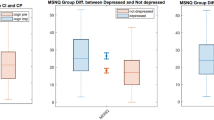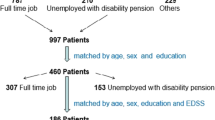Abstract
The association between cognitive impairment, health-related quality of life (HRQoL) and vocational status has been studied in recent years in cross-sectional studies in multiple sclerosis (MS), but longitudinal data are still lacking. This study assesses this association in a sample of 65 newly diagnosed MS patients followed longitudinally. Each patient underwent a standardised clinical assessment, cognitive tests and the HRQoL SEP-59 questionnaire six months after the MS diagnosis (baseline) and seven years later (y7).Vocational status was also established at baseline and at y7 in MS patients. The HRQoL at baseline was severely reduced in MS patients compared with healthy subjects. The independent predictors for HRQoL composite scores at y7 were the baseline depression score and the memory Z-score. Accordingly, 81.5 % of MS patients worked at baseline and only 54.4 % worked at y7. Among the MS patients who did not work at y7, 72.7 % of them were cognitively impaired, while 27.3 % were unimpaired at baseline. The vocational status at y7 was significantly associated with the baseline IPS Z-score, EDSS and age. Vocational status at y7 and its change over 7 years was significantly associated with cognitive deterioration. IPS or memory dysfunction in the early stages of MS is correlated with a decreased level in health perception, independent of fatigue, depression and physical disability. Cognitive impairment at the diagnosis of MS increases the risk of changing vocational status in MS patients seven years later.

Similar content being viewed by others
References
Vernay D, Gerbaud L, Biolay S et al (2000) Quality of life and multiple sclerosis: validation of the French version of the self-questionnaire (SEP-59). Rev Neurol (Paris) 156:247–263
Mitchell AJ, Benito-León J, Morales González JM, Rivera-Navarro J (2005) Quality of life and its assessment in multiple sclerosis: integrating physical and psychological components of wellbeing. Lancet Neurol 4:556–566
Benedict RH, Wahlig E, Bakshi R, Fishman I, Munschauer F, Zivadinov R et al (2005) Predicting quality of life in multiple sclerosis: accounting for physical disability, fatigue, cognition, mood disorder, personality, and behavior change. J Neurol Sci 231:29–34
Brochet B (2011) Prevalence, profile and functional impact of cognitive impairment in multiple sclerosis. In: Amato MP (ed) Cognitive impairment in multiple sclerosis, Elsevier, Milano, pp 1–8
Benito-León J, Morales JM, Rivera-Navarro J (2002) Health-related quality of life and its relationship to cognitive and emotional functioning in multiple sclerosis patients. Eur J Neurol 9:497–502
Barker-Collo SL (2006) Quality of life in multiple sclerosis: does information-processing speed have an independent effect? Arch Clin Neuropsychol 21:167–174
Miller DM, Cohen JA, Kooijmans M, Tsao E, Cutter G, Baier M (2006) Change in clinician-assessed measures of multiple sclerosis and subject-reported quality of life: results from the IMPACT study. Mult Scler 12:180–186
Glanz BI, Healy BC, Rintell DJ, Jaffin SK, Bakshi R, Weiner HL (2010) The association between cognitive impairment and quality of life in patients with early multiple sclerosis. J Neurol Sci 290:75–79
Rao SM, Leo GJ, Ellington L, Nauertz T, Bernardin L, Unverzagt F (1991) Cognitive dysfunction in multiple sclerosis. II. Impact on employment and social functioning. Neurology 41:692–696
Amato MP, Ponziani G, Siracusa G, Sorbi S (2001) Cognitive dysfunction in early-onset multiple sclerosis: a reappraisal after 10 years. Arch Neurol 58:1602–1606
Morrow SA, Drake A, Zivadinov R, Munschauer F, Weinstock-Guttman B, Benedict RH (2010) Predicting loss of employment over three years in multiple sclerosis: clinically meaningful cognitive decline. Clin Neuropsychol 24:1131–1145
de Groot V, Beckerman H, Lankhorst GJ, Polman CH, Bouter LM (2005) The initial course of daily functioning in multiple sclerosis: a three-year follow-up study. Mult Scler 11:713–718
Kern S, Schrempf W, Schneider H, Schultheiss T, Reichmann H, Ziemssen T (2009) Neurological disability, psychological distress, and health-related quality of life in MS patients within the first three years after diagnosis. Mult Scler 15:752–758
Putzki N, Fischer J, Gottwald K, Reifschneider G, Ries S, Siever A et al (2009) Quality of life in 1000 patients with early relapsing-remitting multiple sclerosis. Eur J Neurol 16:713–720
Patti F, Pozzilli C, Montanari E, Pappalardo A, Piazza L, Levi A et al (2007) Effects of education level and employment status on HRQoL in early relapsing-remitting multiple sclerosis. Mult Scler 13:783–791
Deloire MS, Salort E, Bonnet M, Arimone Y, Boudineau M, Amieva H et al (2005) Cognitive impairment as marker of diffuse brain abnormalities in early relapsing remitting multiple sclerosis. JNNP 76:519–526
Deloire MS, Ruet A, Hamel D, Bonnet M, Dousset V, Brochet B (2011) MRI predictors of cognitive outcome in early multiple sclerosis. Neurology 76:1161–1167
Poser CM, Paty DW, Scheinberg L et al (1983) New diagnostic criteria for multiple sclerosis: guidelines for research proposals. Ann Neurol 13:227–231
Lublin FD, Reingold SC (1996) Defining the clinical course of multiple sclerosis: results of an international survey. National multiple sclerosis society (USA) advisory committee on clinical trials of new agents in multiple sclerosis. Neurology 46:907–911
Gayou A, Brochet B, Dousset V (1997) Transitional progressive multiple sclerosis: a clinical and imaging study. JNNP 63:396–398
Leplège A, Ecosse E, Coste J, Pouchot J, Perneger T (2001) Le questionnaire MOS SF-36: manuel de l’utilisateur et guide d’interprétation des scores. Editions Estem, Paris
Vickrey BG (1995) Multiple sclerosis quality of life (MSQOL)-54 instrument. University of California, Los Angeles
Deloire MS, Bonnet MC, Salort E, Arimone Y, Boudineau M, Petry KG et al (2006) How to detect cognitive dysfunction at early stages of multiple sclerosis? Mult Scler 12:445–452
de Groot V, Beckerman H, Uitdehaag BM, de Vet HC, Lankhorst GJ, Polman CH et al (2006) The usefulness of evaluative outcome measures in patients with multiple sclerosis. Brain 129:2648–2659
Deloire M, Ruet A, Hamel D, Bonnet M, Brochet B (2010) Early cognitive impairment in multiple sclerosis predicts disability outcome several years later. Mult Scler 16:581–587
Strober LB, Christodoulou C, Benedict RH, Westervelt HJ, Melville P, Scherl WF, Weinstock-Guttman B, Rizvi S, Goodman AD, Krupp LB (2012) Unemployment in multiple sclerosis: the contribution of personality and disease. Mult Scler 18(5):647–653
Simmons RD, Tribe KL, McDonald EA (2010) Living with multiple sclerosis: longitudinal changes in employment and the importance of symptom management. J Neurol 257(6):926–936
Acknowledgments
The study was conducted as part of a study supported by the Association pour la Recherche contre la Sclérose en Plaques (ARSEP), France, and Bayer healthcare, SA, France. The sponsors did not participate in any aspects of the design or conduct of the study, including data collection, management, analysis, and interpretation, as well as preparation, review, and approval of the manuscript. Dr. Ruet is a recipient of a fellowship-grant from Fondation pour la Recherche Médicale.
Conflicts of interest
The authors do not have any actual or potential conflict of interest including any financial, personal or other relationships with other people or organisations that could inappropriately influence, or be perceived to influence, their work.
Ethical standard
The patients gave written informed consent before inclusion in the study according to the 1964 Declaration of Helsinki. This study was approved by the local ethics committee.
Author information
Authors and Affiliations
Corresponding author
Rights and permissions
About this article
Cite this article
Ruet, A., Deloire, M., Hamel, D. et al. Cognitive impairment, health-related quality of life and vocational status at early stages of multiple sclerosis: a 7-year longitudinal study. J Neurol 260, 776–784 (2013). https://doi.org/10.1007/s00415-012-6705-1
Received:
Revised:
Accepted:
Published:
Issue Date:
DOI: https://doi.org/10.1007/s00415-012-6705-1




